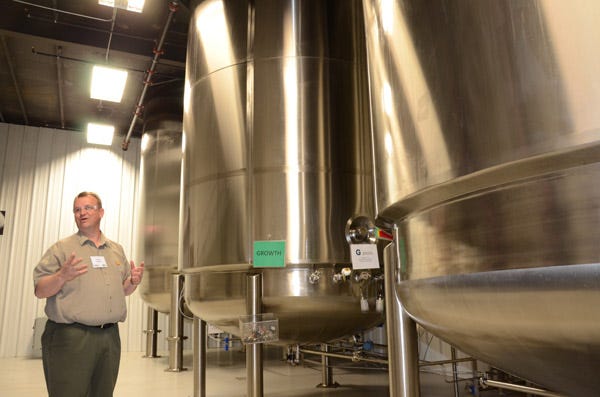April 22, 2013

Eventually, inoculant does grow and move enough until it's being fermented in larger tanks. Feiden stands in the "big tank" room where 20,000-liter tanks are finishing the growth of inoculant. In fact, the tank at the back of the room is a 30,000-liter - or about 66,000 gallons.
Becker-Underwood has been in the inoculants business for some time, and its success hasn't been missed. In fact, the company was acquired by BASF late in 2012 and is the core of a new Functional Crop Care Unit, which includes research, development and marketing activities in the seed treatment, biological crop protection and plant health segments.
Farm Industry News took a tour of the St. Joseph, Mo., Becker Underwood facility to see how inoculants are produced. The company makes a wide range of products, including the soybean inoculant Vault HP plus Integral. The product includes the rhizobial inoculant, a patented growth enhancer and Integral biofungicide in a single package.
This photo gallery takes a look at the steps involved in producing a core product - the rhizobial inoculant. This is a living product and Becker Underwood holds to production standards required in other countries. Interestingly, the United States has very little regulation of rhizobial inoculant products - including what's actually on the seed at planting. However, Canada has a much stricter program, and that's the one Becker Underwood follows.
Chris Feiden, operations manager, Becker Underwood, led a tour for media through the St. Joseph, Mo., facility showing the process. All along the way, he also noted the quality control steps involved in the process, from tracking purity to managing growth.
The inoculant business is competitive and farmers are seeing the potential for this kind of addition at planting to boost yield potential. In fact, the drought of 2012 may have caused a reduction of beneficial Bradyrhizobium japonicum, the chief nodule-building rhizobia, population in the soil ahead of the 2013 crop year. Ohio State University and other experts are suggesting that farmers should consider using inoculant with soybeans for this crop year.
It is that rhizobial inoculum in the soil, through a unique symbiotic relationship, that helps soybeans add those nitrogen-filled nodules on roots. Boosting rhizobial levels by adding inoculant can offer as much as an 11 to 1 return on your investment versus no treatment, according to Becker Underwood.
Check out the gallery and note that from a single vial of inoculum comes a season's worth of product for Becker Underwood to market.
Like photo galleries from Farm Industry News? Subscribe to Farm Industry News Now e-newsletter to get the latest galleries and more straight to your inbox twice weekly.
PLUS - You might also like:
About the Author(s)
You May Also Like






